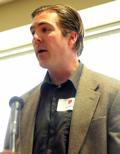
(Photo © J. Maus)
Welcome to Part Five of our six-part, guest article series on bike sharing in Portland.
The series is written by Tom Miller, chief of staff for Portland City Commissioner and Mayor-elect Sam Adams. Yesterday, Tom laid out what’s at stake for Portland in choosing a bike share vendor.
In today’s article, Tom examines some of the key questions that must be answered before PDOT moves forward with this idea.
Part Five: Questions to answer if we want to “get it right”
We’re not sure yet we know what getting it right entails.
Mayor-elect Adams has tasked a team of good minds at PDOT to develop a baseline. Who is the target rider and how do we best provide for them? If we’re simply moving people from transit or foot to bikes it’s a poor investment.
When we mention a multi-million dollar investment in bikes, the eyes of Roger Geller, the City’s ever-dedicated bike coordinator, grow large with ambition. “Is a bike share program the best use of those dollars?” Roger correctly wonders aloud.
Is our target rider traveling from home to transit and back? If that’s the case, does the free half-hour model of Lyon work? Maybe the system needs to allow a rider to take the bike for multiple days. Can a system work logistically if a rider can take a bike for multiple days?
“Our ambition to become a more sustainable city is significant, but our actions in execution of that ambition must be applied methodically.”
What about the city’s hills? How many gears are necessary to accommodate our target rider on our topography? What about our weather? Should we pick up our stations seasonally like Montreal? Or should we aspire for year-round ridership by non-enthusiast “regular people” a la Amsterdam, a city of analogous weather?
Roger, like me, is neither skeptic nor blind supporter. Portland is a leader because we have a history of making smart decisions in a strategic manner. Our ambition to become a more sustainable city is significant, but our actions in execution of that ambition must be applied methodically.
Tomorrow, Part Six (the final piece in the series): The outlook for bike-share in Portland


